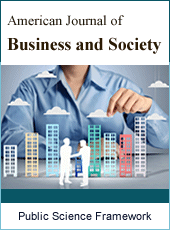American Journal of Business and Society
Articles Information
American Journal of Business and Society, Vol.5, No.3, Sep. 2020, Pub. Date: Aug. 8, 2020
Reasons for the Low Effectiveness of the Third Learning Mathematics Knowledge of Senior High School Students
Pages: 110-118 Views: 1727 Downloads: 323
[01]
Zezhong Yang, The School of Mathematics and Statistics, Shandong Normal University, Jinan, China.
[02]
Yueyue Jia, The School of Mathematics and Statistics, Shandong Normal University, Jinan, China.
400 students from two high schools in the Shandong province of China are surveyed by a questionnaire to study reasons for the low effectiveness of the third learning mathematics knowledge of senior high school students. The result shows: (1) Many students' learning methods are unreasonable. Students don’t compare, summarize, or classify the knowledge after class. And they don’t think about whether the knowledge of the section would be helpful for them to learn the knowledge later. They do less comprehensive exercises of simple answers and proofs, and they don’t reflect adequately after finishing questions. (2) The proactivity of the learning of students is not high. Students can’t actively listen to the explanation of homework of teachers, compare the homework, make up the knowledge that they have not learned well, or reflect on their mistakes. (3) There is a deficiency in teachers' teaching methods. Teachers fail to use appropriate methods to ensure that students can finish their homework on time. (4) There is a deficiency in teachers’ teaching supervision. They don’t provide students with poor grades with individual tutoring. Therefore, following suggestions are put forward: (1) Teachers should cultivate reasonable learning methods and habits of students; (2) Teachers should change the traditional teaching method, and make use of wrong notes to improve the proactivity of students; (3) Teachers should encourage students to finish their homework; (4) Teachers should provide students with poor grades with individual tutoring.
The Third Learning, Mathematics Learning, Review, Reflection, Summary
[01]
Li, X. C., & Li, C. H. (2015). Discussion on Summary and Review of Knowledge after High School Mathematics Class. Research on Mathematics, Physics and Chemistry Problem Solving, 19 (28), 5.
[02]
Zhao, M. X. (2015). How to Improve the Review Efficiency of High School Mathematics after Class. Middle School Mathematics, Physics and Chemistry (Teaching and Learning), 10 (12), 62.
[03]
Chen, S. J. (2020). Research on the Effectiveness of Individualized Tutoring in Senior High School Mathematics under the Intelligent Classroom Environment. Educational Information Technology, 41 (04), 20-22 + 10.
[04]
Wang, Y. Y. (2016). Discussion on After-class Tutoring and Answering Questions in High School Mathematics. Mathematics Learning and Research, 34 (15), 26.
[05]
Wang, J. A. (2016). How to Improve the Efficiency of After-School Tutoring in High School Mathematics. Learning weekly, 10 (21), 150-151. doi: 10.16657/j.cnki.issn1673-9132.2016.21.092
[06]
Liu, H. R. (2019). Good Habits, Great Progress -- the Habit of Summarizing after Class in Junior Middle School Mathematics Teaching. Mathematics Learning and Research, 37 (04), 49.
[07]
Wu, X. Y. (2019). Research on Cultivation Methods of the Ability of After-class Summarizing and Habits in Junior Middle School Mathematics Teaching. Mathematics Learning and Research, 37 (04), 52.
[08]
Wu, R. H. (2016). After-class Review is an Indispensable Part of Mathematics Teaching. Basic Education Research, 29 (04), 61-62.
[09]
Pan, L, Z. (2011). The cultivation of review consciousness of primary school students after mathematics class. Journal of Guilin Normal College, 25 (02), 190-192.
[10]
Wang, M. A. (2010). Guiding Students' Reflection after Class to Promote Students' Independent Learning. China Mathematics Education, 8 (10), 14-16.
[11]
Zhang, D. F. (2008). Let Students Benefit from Reflection. Journal of Suzhou Education Institute, 11 (03), 95-96. doi: 10.13985/j.cnki.34-1227/c.2008.03.064
[12]
Zhang, P. (2015). Strengthen Reflection after Problem, Develop Problem-solving Wisdom. Mathematics Learning and Research, 33 (09), 115.
[13]
Cao, R. C. (1987). General Psychology. Beijing: People's Education Press, (04), 241-241.
[14]
Zheng, J. P. (2002). A Brief Introduction to Reflective Learning. Journal of Shanghai Educational Research, 22 (08), 43-46. doi: 10.16194/j.cnki.31-1059/g4.2002.08.012
[15]
Tu, R. B. (2000). Try toTalk about Reflective Mathematics Learning. Journal of Mathematics Education, 9 (04), 17-21.
[16]
Shi, L. F. (2001). Learning Theory. Beijing: People's education press, (05), 222.

ISSN Print: Pending
ISSN Online: Pending
Current Issue:
Vol. 6, Issue 4, December Submit a Manuscript Join Editorial Board Join Reviewer Team
ISSN Online: Pending
Current Issue:
Vol. 6, Issue 4, December Submit a Manuscript Join Editorial Board Join Reviewer Team
| About This Journal |
| All Issues |
| Open Access |
| Indexing |
| Payment Information |
| Author Guidelines |
| Review Process |
| Publication Ethics |
| Editorial Board |
| Peer Reviewers |


